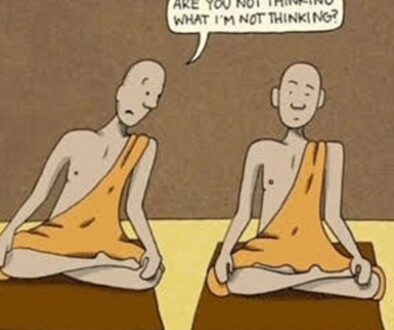Paul’s Story (Addendum to A Letter from the Field)

Paul lives with his wife, Debbie, follow this teaching closely and live in the Netherlands.
The Santa-Clausness of Life
1
Twice I had to think of Santa Claus this week. Just an hour ago, looking at the somber weather
outside, rainy and windy and clearly indicative of the darker period to come, which is to end with the
arrival of Santa Claus – although in the Netherlands he (answering to the name of “Sinterklaas”) visits
earlier, 5th of December, and not at Christmas eve. And yesterday, when my younger sister called to
chat, and told about the Sinterklaas festivities she has to organize all ready in advance for the
children of the employees – she works in human resources.
It is a strange thing we teach our children in this tradition. We learn them to (almost religiously)
believe in some person who doesn’t really exist, and go to enormous lengths to make this belief work
for as long as we can, until the children finally, each in his/her own moment, manage to make the
illusion pop, sometimes much to their own sadness. But the fact that the festivities will still go on,
and they can still unwrap their present, softens the blow for most of them. They were only able to
pop the illusion because they ran into the borders of their parents’ lie, where the story collides with
the real world and reveals the improbabilities of the illusion. But what if the illusion would have been
perfectly implemented? What if Santa Claus had taken over the world, nestled in our brains and
every one believed in him permanently? How then to escape his influence? It would be impossible,
or would it?
There is a compelling case to be made that “liberation”, the collapse of the egoic structure of the
brain, also called mind, has a lot of similarities with the popping of the belief in Santa Claus.
“Me” is like Santa Claus. It exists as a story and appears as real, as long as there is belief. We are not
born with the belief that we are “me”, but we are deceived into believing it. People, starting in most
cases with our parents, tell us that we are “some one” and they are “some one other”. They point at
the child and at their own body alternatively and use birthnames to clarify what they mean, because
this is not at all self-evident to the young child, who is oblivious of this differentiation. It still felt One
with All. But right there the separation starts and the child gradually does not feel like a feature of
wholeness anymore, but alone and surrounded by the otherness that is world. It starts believing in
this illusion, copying the belief of his parents, listening to its birthname. And it starts calling the
parents by the name of daddy or mommy. This is applauded and much celebrated. The first
identification in life has taken place, it is like the Christmas tree of the mind has been put up. In the
course of life, the tree will be filled with many ornaments in the form of more identifications, each
with his own problems and little rewards. But a price has to be paid for that as well, because many
people can remember losing the feeling of Oneness, sometimes described as an “Oceanic” feeling at
some point in their youth, and being very sad about it. And they spend the rest of their lives to get it
back, or some surrogate of it in the form of success, happiness, love, power, possession etcetera.
Unlike the Santa Claus story, no one ever tells the child of the falsehood of the story that got him or
her conditioned into separateness, which is only a poor abstraction of the unknowable truth and the
miracle of direct aliveness and being. On the contrary, most people go on believing in the story of
being “only me” for the rest of their lives, disconnected from their source by a sheet of mind-formed
beliefs and conditioning. And they keep telling this story to themselves, their children and others,
and try to make the best of it. It’s called the human condition. This “best” however is often a rather
poor experience, resulting in the trouble of the world. If we disconnect from our source and are
taught to only experience a very small, repetitive and temporal version of it (the “me-part”), where
all the magic is replaced by abstract knowledge of science, and trust is replaced by knowing and
2
control, nothing more can be expected. No wonder real happiness is hard to find. We look for it in all
the wrong places.
Some perennial philosophies however (like described in the Hindu Veda’s, the Pali-Canon of Buddhist
philosophy, but also in the Christian Bible in the form of the life and teachings of Jesus), in their core
show us that it is possible to rid oneself from the belief in the separate self. To go beyond mind and
ego. To again uncover the oceanic feeling of Oneness we had in our early youth. Phrases like for
instance “The kingdom of Heaven is within you” (the realm of consciousness is who you are), point to
this possibility. Organized religions have mostly misunderstood the meaning of this and placed this
Heaven in the afterlife (which is another story of the separate mind), but originally this points to
wholeness, the natural state (Sahaja in Sanskrit) of non-separation we were all born in to (the
unborn mind, in Zen-terms), which is the underlying layer of who we are, ever present. So if we want
to situate this in time at all, it points much more to a pre-life than an afterlife. And actually it points
to the timeless and blissful state of being-here-right-now (in Sanskrit: Satchitananda). A state of
experiencing reality directly, without the interface of time, thinking, judging and separation. The
popping of this illusion is sometimes called “enlightenment” or “awakening”, but I like to use the
word “liberation”. It frees us from the limited view of the mind and brings us in direct contact with
reality. Realization is another good word therefor.
When this happens, when the mind is seen through, it stops. There is still a remembrance of
separation, but also the knowing that it is an illusion. And there is the knowing that it never was real.
And it will never be believed in again. Santa Claus has left the building.
Losing the belief in the story of “me” is however harder and rarer than seeing through Santa Claus,
because this “me” tends to appear not only once a year but every morning when we open our eyes
and for the rest of the day, only to disappear in deep sleep. And it has managed to make believe not
only that it is real, but that it exists “as us”, that we are it (identification). It poses as everything that
happens, by creating the illusion that everything happens to me. It is really a magical but Kafkaesque
trick that it pulls off. And Unlike Santa Claus, who is outside us, this mind-illusion is a feature of our
own brain, it is inside the system and therefor has access to the buttons and dials of our experience.
It can not only produce thoughts, but also make the body feel an emotion (like sadness, joy, fear,
hate, rage or loss) or sensation (like pain, warmth, cold, shivering, nausea). So it uses every thought,
belief, sensation and feeling to prove its own existence by falsely telling us that all these phenomena
are happening to us.
Getting rid of this false belief is so weird because it seems that we then lose ourselves as well, and
not only a belief. This of course is not true, because there is no real self to lose (as there is no real
Santa Claus to lose), for it never really existed in the first place; it came with and as the belief. When
this belief in the separate Me stops, what is left is only this knowing that cannot be
understood, because there is no one left to do that. What is left is nothing, apparently happening as
everything, which is beyond understanding, control or belief. And these happenings are no longer
seen as confirmation of Me, but as confirmation of the One.
Only when we really are convinced of the total falseness of the belief, which is also the total
falseness of the separate Me, the Me stops. It can happen any moment, but it is not a doing nor can
it be done by the me. Any (belief in) doing of the me only reinforces the me. It is the cessation of the
illusion of doing and being separate that gets rid of me and separation all together. What is left is
pure being, pure happening without any one knowing it. It is completely free and without any
concept, agenda or attribute. Totally impersonal being. Which is im-mediate reality without
distance. This is liberation.
3
There are many accounts of people who have gone beyond the mind. People like the Buddha or
Jesus. Many Indian sages can be mentioned. Now they are famous, but originally they were all
ordinary people who found out, some way or another, the reality beyond the veil of the mind and
tried to tell the world about this other, more pure, reality. Mostly they were misunderstood, some
had to pay for it with their lives. The minds of the world don’t like to be caught in the act, and
exposed as a fraud or fake identity-machine, creating a virtual reality in our brains that brings a lot of
trouble. Often their pure and simple message was turned into a religion or philosophy that became
complicated and mystified, and hard to follow or understand.
And there are also many more people that have gone beyond the mind who are not accounted for.
We all have this possibility if we are present. Because even this virtual reality of the mind has its own
discontinuities, little events, things or thoughts that we might run into in our lives that make us
question and doubt, like the little child starts to doubt Santa Claus on discovering certain
unexplainable parts of the story. It can happen as a result of a life crisis, where we lose most
identities in one blow, or it gradually starts with the feeling “is this all there is?”, or with a slow
increase in suffering the consequences of a life in separateness from nature, until the mind cannot
longer bear it. Or it can happen because the Oceanic feeling does not get covered completely, it
keeps pulling and we keep looking for it and finally it pulls us in again completely. Suddenly or
gradually, for some of us the story of the mind collapses or crumbles, and finally disappears.
Many of us will have be satisfied with small liberations like the life-after-Santa Claus. The mind has a
lot of ways to prevent an investigation into its own illusory existence. But sometimes, liberation just
finds its way spontaneously anyhow. Reality (that what unknowably is) doesn’t change, but the
viewpoint of the liberated brain is quite different. It is a very natural and normal reality, but it has a
ring of truth and freshness about it, a crisp clarity that the mind could never grasp. And a lot of
peace, space and stillness, combined with an absence of frustration and fears. A peace that
surpasses all understanding.
As a child, I was taught to believe in Santa Claus and the possibility of getting some presents
occasionally. Growing up, I learned to go beyond the Santa-Clausness of life.
Now the Present unwraps every magical moment.
Paul Jordaans
Grathem, October 2021
© www.parkinsjordaans.nl 2021



